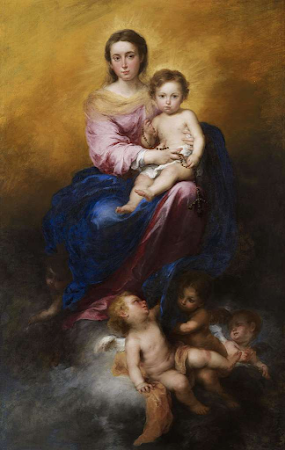+JMJ
"We believe it to be part of the designs of Providence that, in these times of trial for the Church, the ancient devotion to the august Virgin should live and flourish amid the greatest part of the Christian world. May now the Christian nations, . . . seek the protection of Mary with an ardour growing greater day by day; let them cling more and more to the practice of the Rosary, to that devotion which our ancestors were in the habit of practicing, not only as an ever-ready remedy for their misfortunes, but as a whole badge of Christian piety.
(Supremi Apostolatus Officio, Encyclical on Devotion to the Rosary
Pope Leo XIII, 1883)
When Father Patrick Peyton was miraculously cured of Tuberculosis by the Blessed Mother, he solemnly promised to repay this heavenly Queen by spreading devotion to her and her Son. Momentarily he thought to encourage devotion to the family rosary and attendance at daily Mass. But upon further reflection, he realized that the latter was not attainable for everyone whereas the former could be.
By its very nature, the rosary has always been a prayer for simple souls. Its very name—Our Lady's Psalter,—reveals this simplicity as it was proffered as an alternative breviary for the mostly illiterate populace, its fifteen decades each composed of ten Hail Marys mirroring the 150 psalms recited by educated religious.
Greatness lies in littleness; sanctity shines in humility. It is not the grandeur of the prayer that is important, but the majesty of the one it is addressed to. When Naaman the Syrian is told to wash seven times in the Jordan, he initially ridicules Elisha for this mundane request, questioning its efficacy in curing his leprosy. Yet his servants implore him to obey:
"My father, if the prophet had commanded you to do some great thing, would you not have done it? How much rather, then, when he says to you, ‘Wash, and be clean’?”
If modern man scoffs at its repetitive, elementary nature, perhaps it is because of his own disordered soul, with its insatiable desire to constantly excite passions, forever seeking distractions to quell his inner unrest. In Laetitiae Sanctae, one of eleven encyclicals written by Pope Leo XIII on the Rosary, the Holy Pontiff keenly observed the modern temptations which cause man to recoil from this prayer:
There are three influences which appear to Us to have the chief place in effecting this downgrade movement of society. These are-first, the distaste for a simple and laborious life (Joyful Mysteries); secondly, repugnance to suffering of any kind (Sorrowful Mysteries); thirdly, the forgetfulness of the future life.(Glorious Mysteries)."
For most of Christian history, the rhythm of the liturgical year, and daily prayer existed alongside the tempo of agricultural life. Though society as a whole will not return to its agrarian roots, the family can recover the simplicity of that life by again embracing the order and rhythm Our Lady offers through the recitation of the daily rosary. This constant prayer is like the silent heartbeat of the home, pumping and preserving life, felt but unseen. Fidelity, like love, requires an act of the will. One must daily decide to be a faithful servant of Our Lady, not on a whim, not in a dramatic fashion, but in consistent and patient perseverance.

